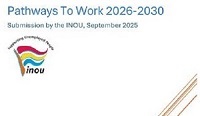Context and Purpose
The INOU’s submission responds to five key consultation questions and highlights the lived realities of those distanced from the labour market.
Despite Ireland’s low unemployment rate (4.8%), challenges persist:
- Youth unemployment stands at 13.2%, with young people making up one-third of the unemployed.
- Long-term unemployment affects over 31,800 people.
- Women, Travellers, Roma, disabled people, and lone parents continue to face systemic barriers to the labour market.
Progress and Lessons from 2021–2025
The previous strategy saw notable achievements:
- Expansion of the Employability service for disabled people.
- Introduction of Jobseekers Pay-Related Benefit to cushion income shocks.
- Growth of Local Area Employment Services (LAES) and Work & Skills events.
However, education and training participation for people on the Live Register dropped by 28%, and systemic inequalities remain entrenched.
Key Challenges for 2026–2030
1. Labour Market Exclusion
Marginalised groups face complex barriers—low education, health issues, discrimination, and caring responsibilities. The INOU calls for a whole-of-government approach and enhanced outreach by the Intreo Employment Service.
2. Skills Mismatch
Ireland has one of the highest rates of skills mismatch in the OECD. Many people are either overqualified or require support to develop their skills, which is often not provided in the formal education system. The INOU urges:
- Investment in adult and community education
- Expansion of ESOL and literacy programmes
- Ensuring participation in education and training is encouraged, and barriers to engaging in education are removed.
3. Data and Service Gaps
The INOU supports the creation of a National Skills Observatory to align training with labour market needs. Public Employment Service (PES) staff should be trained to use labour market intelligence to guide jobseekers effectively.
4. Generative AI and Workforce Displacement
With 1 in 3 Irish workers exposed to AI-driven task replacement, the INOU warns of declining entry-level jobs and potential discrimination in automated systems. The strategy must ensure:
- The use of AI is underpinned by principles
- Income safeguards
- Inclusive AI policies
5. Youth Unemployment
Young people face reduced welfare rates and limited access to supports. The INOU recommends:
- Parity of esteem for non-traditional education paths
- Enhanced guidance services
- Removal of discriminatory welfare payment structures
6. Marginalised Groups
Despite overall employment growth, participation by disadvantaged groups lags behind EU averages. The INOU advocates for wraparound services and person-centred supports to promote decent work.
7. Public Employment Service Reform
Currently, PES only fully supports those on welfare payments. The INOU proposes expanding services to all working-age individuals, including those not eligible for welfare but in need of career support.
Conclusion
The INOU’s submission is a call to action for a more inclusive and responsive labour market strategy. By addressing systemic barriers, investing in lifelong learning, and preparing for technological shifts, Ireland can ensure that no one is left behind in the pursuit of decent work.
Please see the link to the Submission below:
https://www.inou.ie/analysis/submissions/pathways-to-work-2026-2030-inou-submission/
